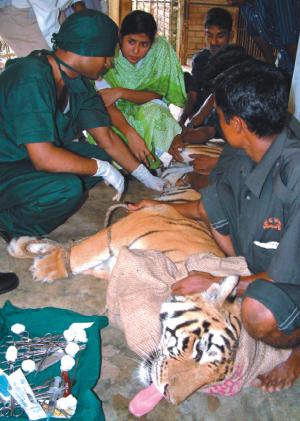|
Sorry
Tales of
Zoo Inmates
Aziz
Amirul
Famed
for its regal grandeur and marauding behaviour over all
other wild creatures of the mangrove habitat of  the
Sunderbans, the majestic Royal Bengal Tiger is one of the
best reasons why eco-tourism may have a future in Bangladesh. the
Sunderbans, the majestic Royal Bengal Tiger is one of the
best reasons why eco-tourism may have a future in Bangladesh.
Unfortunately
though, this very species of the world's largest cats is
the main target of poachers who, ever since, are on the
prowl to hunt the tigers to earn handsome amounts. Illegal
trading of hides, bones and organs of the animal in the
international black market is quite rampant. Moreover, the
demands from producers and clients of so-called 'Chinese
medicinal products' are also taking a toll on tigers. The
crime often goes unabated though there is maximum punishment,
that is, death sentence for the offence of killing tigers,
a maximum of around 450 of which are believed to be left
inside the Bangladeshi territory of the mangroves of Sunderbans.
History
was created on September 10 this year when five employees
of the Dhaka Zoo were handed over to the law enforcement
angency and were tried for the crime of killing a zoo animal.
The verdict was imprisonment of fourteen years with fines
of Taka twenty thousand each for their alleged involvement
in the poisoning and eventual killing of four Bengal Tigers.
Their am was to procure the creatures' skins and to halt
a transfer of 32 zoo staffers during November 1996.

Vets
collect tissue from the infected lump of ailing tigress
Shankari at Chittagong Zoo before she died.
Negligence
and misappropriation of allotted funds in zoos is a common
transgression here in Bangladesh where conservation of wildlife
and overall ecosystem remains a topic of minor importance.
It is an issue usually dealt with indifference by the concerned
authorities with very little effectiveness of the Wildlife
Preservation Act of 1974.
Besides
Dhaka, several other smaller zoos lie across the country,
of which three are situated in Chittagong, Rajshahi and
Rangpur. Unfortunately these zoos are infested with all
sorts of irregularities the most notorious allegation of
all being the mishandling of allotted food supplies of zoo
creatures which are allegedly sold in open markets or shared
among employees' for personal gains.
Death
of creatures out of laxity and malnutrition or unhygienic
conditions, which are easily avoidable, is another major
problem in local zoos. The latest victims were four animals
and a bird at Chittagong zoo - one lion, two deer, one heron
and a monkey, according to news reports. These creatures
died within a week during the first half of August this
year.
Leading
wildlife experts of the country claim that the Chittagong
zoo does not have a strong supervision system and those
five inmates of the zoo have died from food poisoning, but
according to zoo officials and post-mortem report, the expired
lion, aged 23, died a natural death.
According
to highly placed sources, the food supplied to the animals
is unhygienic and of sub-standard, which cause various diseases
and most of the zoos do not have full-time veterinary surgeon-cum-caretakers
who can check on the foods' quality.
The
Chittagong zoo has even more woeful stories involving carelessness
with its caged inmates, especially with Bhim, the male Bengal
tiger that managed to escape from its barred enclosure twice
within a year, the last time this August when the big cat's
 caretaker
mistakenly left the cage-door open during feeding hours.
On both occasions the tiger retuned to its cage apparently
being nervous and unaccustomed to the scamper and screaming
of the crowds. caretaker
mistakenly left the cage-door open during feeding hours.
On both occasions the tiger retuned to its cage apparently
being nervous and unaccustomed to the scamper and screaming
of the crowds.
But
of all the recent zoo incidents, the worst took place in
the same zoo in Chittagong on the early hours of the first
day of October this year when Shankari, the lone tigress
and mate of Bhim, passed away of a malignant condition at
a mature age of seventeen. A darling of the regular zoo
visitors of the country, Shankari was once an important
resident of the Mirpur Zoo in Dhaka but was relocated in
Chittagong some ten years back along with Bhim, also currently
running seventeen, one year short of a tiger's maximum life-span.
Shankari
was first diagnosed with a tumour and was operated upon
by a team of vets on July 21 last. According to news reports,
alleged negligence in post-operative care and lack of proper
treatment and medications led Shankari to fall ill; hence
the tigress was once again placed under the surgeons' knife
on September 13. Tissue biopsy revealed conditions of Adeno
Carcinoma, an advanced staged cancer.
It was
the pre-dawn hours of October 1, 2003 when some loud yet
painful growling could be heard from inside the cage of
ailing Shankari. Everyone knew that the tigress's days were
coming to an end but hardly thought of the worst to come
so early. Daylight spread her veils across the lush green
surroundings of the zoo compound while the caretaker of
the tigers along with a veterinary specialist reached the
cage of the big cats. But by then it was all over. The huge
lifeless body of Shankari was found lying in a stiff condition
leaving aside a desolate and lonely Bhim to mourn the sad
demise of his life partner.
The
sad tale could end here provided the authorities had quickly
disposed off the body following formal procedures of post-mortem,
etc. But there was further agony left for her distressed
partner, Bhim to witness. Starting from dawn till around,
five o'clock in the evening, for over twelve hours, there
remained in the cage the decaying corpse of  Shankari,
leading to a dreadful stench with risk of spreading germs
all around something which forced the visiting guests to
leave the zoo premises while covering then faces with handkerchieves.
The authorities finally had time only around sunset to carry
away the badly decomposed body for mere dumping somewhere
behind the zoo office. Shankari,
leading to a dreadful stench with risk of spreading germs
all around something which forced the visiting guests to
leave the zoo premises while covering then faces with handkerchieves.
The authorities finally had time only around sunset to carry
away the badly decomposed body for mere dumping somewhere
behind the zoo office.
'It
seems better to let the poor animals roam around in the
wild and die some untimely, rude deaths in the hands of
the ever-increasing influential poachers rather than to
be locked up in zoos to be neglected and assaulted in the
worst possible manner by the untrained and careless zoo
authority', was the comment of a grief-stricken zoo visitor
who witnessed the shoddy treatment of Shankari's corpse
throughout the day till evening.
| 
 the
Sunderbans, the majestic Royal Bengal Tiger is one of the
best reasons why eco-tourism may have a future in Bangladesh.
the
Sunderbans, the majestic Royal Bengal Tiger is one of the
best reasons why eco-tourism may have a future in Bangladesh.
 caretaker
mistakenly left the cage-door open during feeding hours.
On both occasions the tiger retuned to its cage apparently
being nervous and unaccustomed to the scamper and screaming
of the crowds.
caretaker
mistakenly left the cage-door open during feeding hours.
On both occasions the tiger retuned to its cage apparently
being nervous and unaccustomed to the scamper and screaming
of the crowds. Shankari,
leading to a dreadful stench with risk of spreading germs
all around something which forced the visiting guests to
leave the zoo premises while covering then faces with handkerchieves.
The authorities finally had time only around sunset to carry
away the badly decomposed body for mere dumping somewhere
behind the zoo office.
Shankari,
leading to a dreadful stench with risk of spreading germs
all around something which forced the visiting guests to
leave the zoo premises while covering then faces with handkerchieves.
The authorities finally had time only around sunset to carry
away the badly decomposed body for mere dumping somewhere
behind the zoo office.